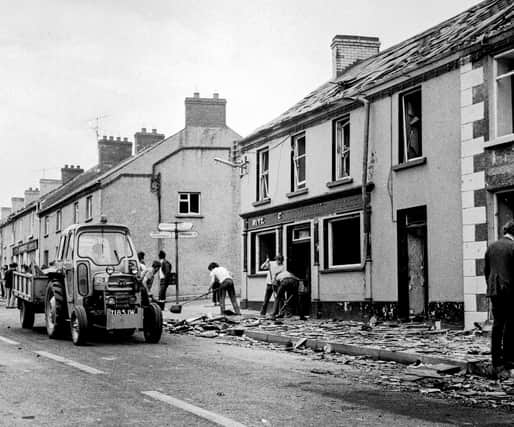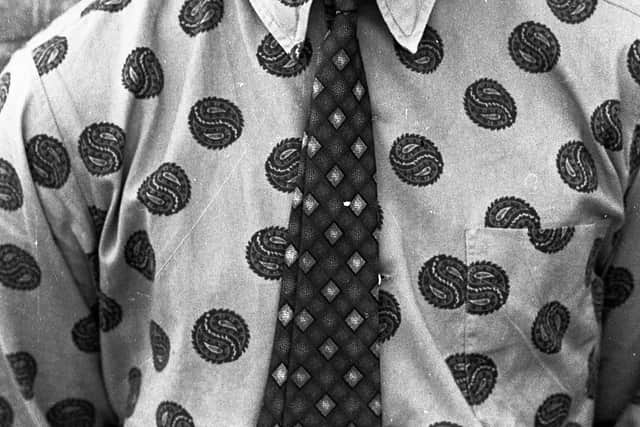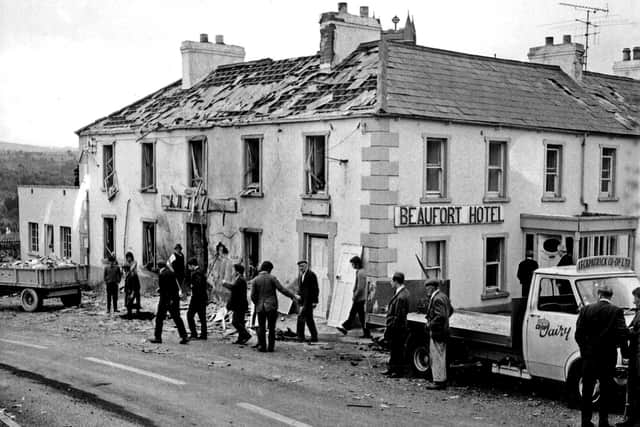Claudy Bombing 50 Years On: Ex-Derry Journal reporter recalls horror of witnessing a village torn apart


Samuel Liggett, or Samuel Wilberforce Liggett, to give him his full name, was one of the senior doctors in charge at Altnagelvin Hospital in Derry on July 31, 1972. Just before eleven o’clock that morning, he was informed by the RUC and by the ambulance service that multiple casualties were on the way to the hospital from Claudy, a village about twelve miles away.
A quiet village relatively spared the ravages of the violence endemic in Northern Ireland at the time, Claudy had been targeted by bombers that morning. Three no warning car bombs had exploded in the village, two in Main Street and one in Church Street.
Advertisement
Hide AdAdvertisement
Hide AdNine civilians lay dead and scores more were injured. The triple bomb attack occurred just ten days after the Provisional IRA had killed nine civilians and injured over one hundred more in a spate of twenty two bomb blasts on Bloody Friday in Belfast.


Samuel Liggett knew what was coming his way. Prior to becoming a consultant gynaecologist, he had been attached to the RAF bomber command in south east England during WWII. He was experienced in dealing with trauma injuries caused by explosions.
He called a meeting of his senior medical staff during which he asked his senior nurses to send the on duty student nurses home. He didn’t want them to witness what he knew was coming to the hospital.
Staff at the hospital were already on full alert on July 31, 1972. They expected numerous casualties as a result of Operation Motorman, a military operation launched by the British army with the aim of retaking the so called no go areas of the Creggan and Bogside in Derry and of sections of Newry, Armagh, Belfast, Lurgan and Coalisland.
Advertisement
Hide AdAdvertisement
Hide AdEarlier in July 1972, the Provisional IRA had destroyed the telephone exchange in Claudy in a bomb attack. The Claudy bombers left the three car bombs in the village but were unable to telephone in their bomb warnings because the local telephone exchange was still out of operation.


No organisation has ever admitted responsibility for the triple bomb attacks but the suspicion among many local people is that the Provisional IRA planted the three car bombs in a botched attempt to divert sections of the British army and RUC away from Operation Motorman in Derry to Claudy, a theory always denied by the IRA.
July 31, 1972, was also the start of my second week as a full time junior reporter for the Derry Journal newspaper. The editor, Thomas F. Cassidy, called me into his office. The newsroom was depleted of staff who were up town covering Operation Motorman.
Mr. Cassidy said he didn’t want me to go up town because it was too dangerous. Instead he told me to phone Foyle Taxis and book a taxi to take me to Claudy. There I was to collect the Claudy notes, local community notes for insertion in the Friday edition of the Derry Journal along with notes from other villages in the newspaper’s readership areas of Counties Derry and Donegal.
Advertisement
Hide AdAdvertisement
Hide AdNormally, the notes were hand delivered to the newsroom, sometimes along with advertisements. But, in those days, Derry had only one bridge crossing the River Foyle and, on the morning of Operation Motorman, the upper deck of Craigavon Bridge was closed to the general public.
The lower deck was, however, open to military, police, fire brigade and ambulance vehicles and to the local media on production of an accredited pass.
My Foyle Taxi driver that morning was Jimmy Breen, joint proprietor of the taxi firm as well as being a bookie. On the journey to Claudy, he regaled me with stories about betting coups and foiled coups at the Brandywell greyhound racing track.
He dropped me off in Claudy’s Main Street and I went in search of the Claudy notes writer.
Advertisement
Hide AdAdvertisement
Hide AdSuddenly, bang, the first bomb exploded, causing deaths, injuries and destruction. Minutes later came the second bang and I watched in horror as local people moved the casualties into nearby Church Street.
Bang, the third bomb went off again without warning in Church Street, killing one of the casualties who’d just been taken there from Main Street. No-one knew if other bombs were going to explode.
There were no mobile ‘phones in those days and, because of the destruction caused to the local ‘phone exchange, it took some time before news of what had transpired in Claudy over a fifteen minute period filtered out.
One of the first to die that morning was eight years old schoolgirl Kathryn Eakin. Several years after the atrocity, by coincidence, I was in the compensation court in Bishop Street. Her parents, Billy and Merle, were compensated with less than £50 for their daughter’s death.
Advertisement
Hide AdAdvertisement
Hide AdThe sum was to cover her funeral expenses and the assessment was based on the fact that she was not an earner nor in employment at the time of her death.
Jimmy Breen drove me back to the Derry Journal offices on the Buncrana Road. We both wept during the quiet journey back. The Craigavon Bridge had now been closed to all traffic and we made our way back to the offices via Strabane, Lifford and St. Johnston.
The newsroom staff were naturally preoccupied covering Operation Motorman, unaware of the enormity of what had happened in Claudy. I went in to Mr. Cassidy’s office and told him what I’d seen. I broke down and he told me to go home, which I did.
○ George Jackson is a freelance journalist.